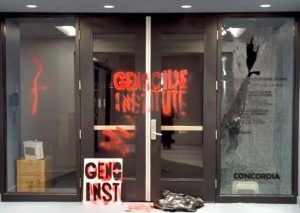The Toronto Jewish Film Festival is presenting the Toronto premiere of the award-winning, controversial movie Aftermath on Nov. 24.
Although it is a work of fiction, this gothic Holocaust thriller was inspired by the 1941 Jedwabne massacre in Poland and was banned in several cinemas in that country.
It takes place in 2001. Franek returns to his native Poland after living in Chicago for around 20 years, to visit his estranged younger brother, Jozek who lives alone on the family farm since his wife suddenly took the kids and left for America.
The farm is in an isolated village. Franek has to take a taxi from the airport to the train station, and then a bus to the village from which the nearest stop is a long walk through winding country roads. He arrives at the family farm late at night and is greeted by his brother wielding an axe. He immediately gets into a heated debate with Jozek, accusing his older brother of abandoning their parents and not returning for their funerals.
Shortly thereafter a rock is thrown through the windows, and we quickly learn that Jozek is not well-liked by the local villagers.
The film, tightly written and directed by Wladylsaw Pasikowski, takes a creepy, suspenseful turn, similar in tone to the 1971 (and its poor 2011 remake) Straw Dogs. Franek sees that his brother is harassed at every turn and beaten up by drunks in a pub. At harvest time, the harvester doesn’t come to their farm as scheduled, and soon Franek himself is being followed.
Curious, Franek discovers from the one friendly soul in town, a young woman who works at the clinic, that Jozek is collecting Jewish tombstones. She tells him that during the war, the Nazis ripped the gravestones from a Jewish cemetery and used them to pave a road. After the war, a new road was placed over them, but when a flood washed the new road away about 10 years ago, the gravestones were unearthed.
Since then, Jozek has been collecting them and erecting them on his farm. The villagers are especially upset that he plans on taking the stones from around the church bell tower.
Jozek admits this to his brother, telling him he’s not sure what compels him to do this, only that it seems wrong to him that people are using these gravetones to walk on or as work benches.
“There’s no one left to look after their dead,” he explains, revealing in the process that he has learned to read Hebrew. He meticulously cleans these gravestones, reciting the names written on them.
Franek, whose language occasionally displays ingrained anti-Semitism (he calls Jews “Yids”), thinks his brother is crazy, but, as the older brother, feels the need to protect him.
Curious that no one seems to want to talk about what happened to the village’s Jews during the war, he continues digging, at one time quite literally, despite the physical threats from the villagers. He soon discovers a big secret about the village’s wartime past, one that, like the gravestones, the townspeople would prefer remain buried.
Aftermath is a fast-paced, suspenseful thriller inspired by a 2001 book, Neighbors, in which historian Jan T. Gross revealed that it was Poles who massacred the Jews in Jedwabne and not the Nazis, as the official government account reported.
Aftermath won the Yad Vashem Chairman’s Award at the 2013 Jerusalem Film Festival.
It is screening at The City Playhouse Theatre, 1000 New Westminster Dr., Vaughan. Doors open for tea at 4 p.m. Screening at 5. Producer Dariusz Jablonski will be in attendance and a Q & A will follow.
For advance tickets: www.tjff.com. 416-324-9121






